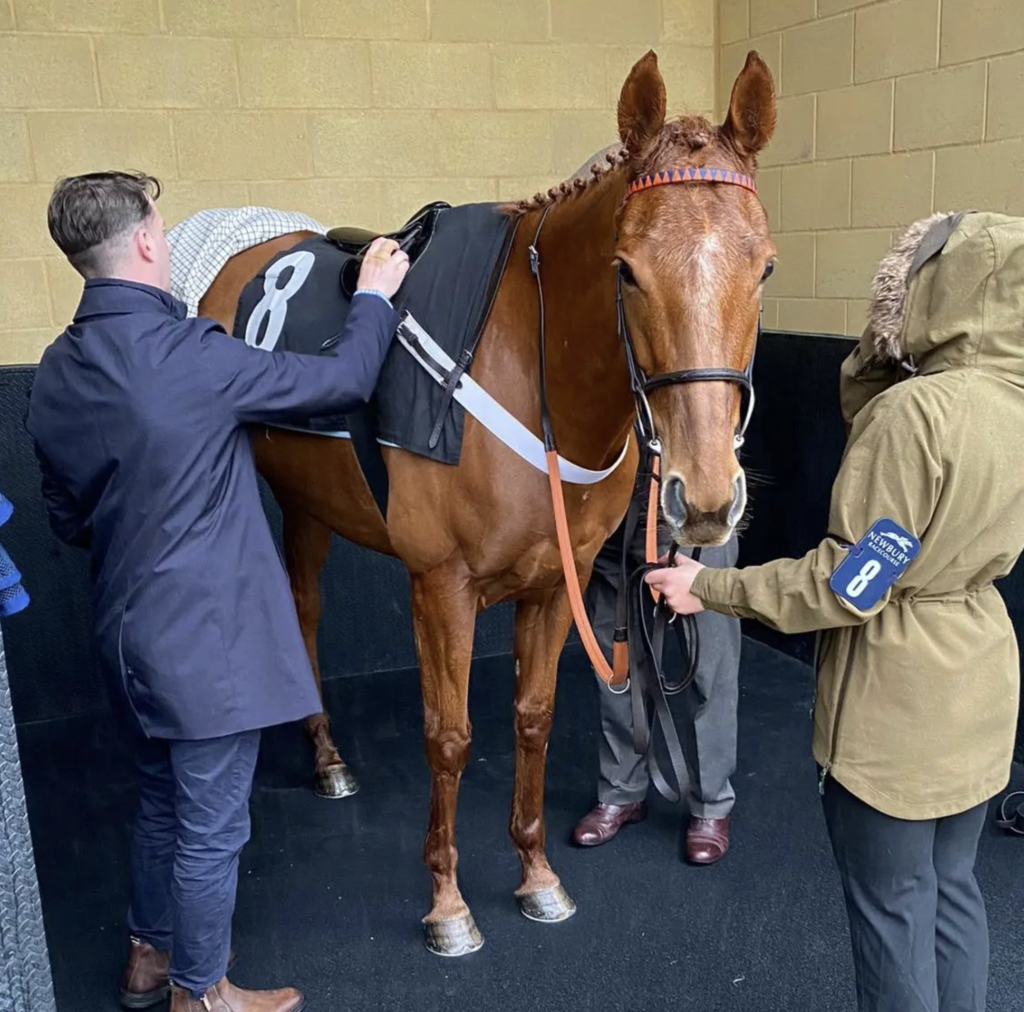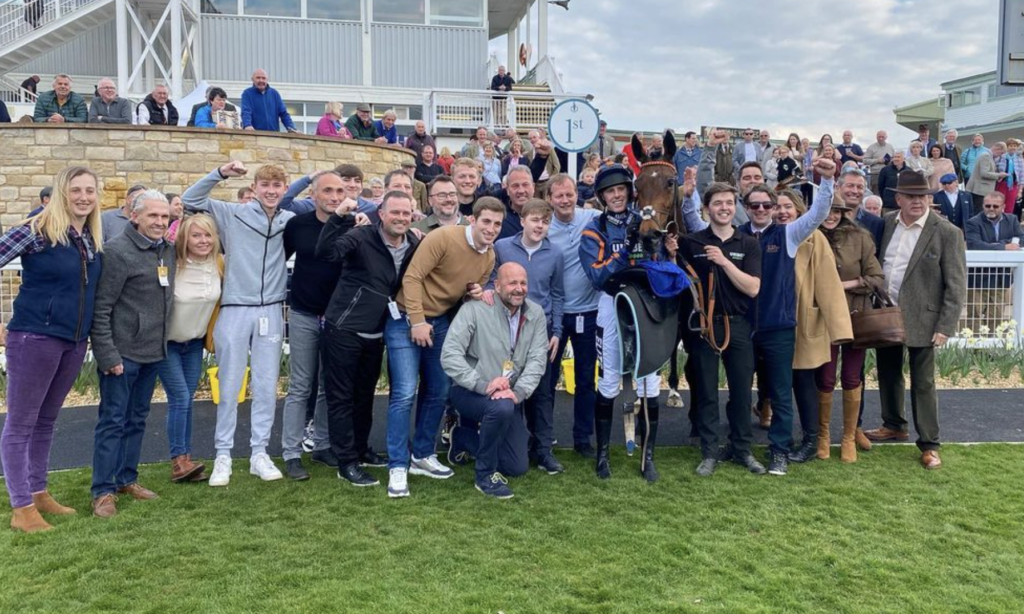Should I Lease Or Own A racehorse?
Racehorse Ownership vs. Leasing – What’s your best bet in the racing world?
So, you’re thinking about getting involved in the exhilarating world of horse racing. But, how do you go about it? Should you lease a racehorse? Or, is it better to buy a horse? What’s the real difference between the two?
Here at Canter Banter Syndicate, we want to give people from all walks of life a real ownership experience, and we do this through both lease and purchase agreements.
There’s no right or wrong answer when choosing between the two. They both offer plenty of perks, and a lot of it will depend on your circumstances and what you hope to get out of the experience.
A lot of our members started off leasing and loved it so much they decided to purchase shares in a horse. Many have stayed with the lease model, and some jumped straight into ownership off the bat! So, let’s delve into the details and figure out what’s right for you, shall we?

What is Leasing?
Leasing a racehorse is a fantastic way to experience the excitement of racing without the long-term commitment of ownership. When you lease, you pay one fee per year, known as the lease fee, which covers everything—training, vet care, race entries, and more. But here’s the important part: you still get your share of any winnings. So, if you lease 5% of a horse, you’ll receive 5% of the prize money after deductions like the jockey’s cut. It’s a simple and straightforward way to get a slice of the action.
What is Ownership?
Ownership takes your involvement to the next level. First, you pay a one-off fee to buy your share of the horse. Then, like with leasing, you pay an annual fee to cover ongoing costs. Just like leasing, if your horse wins, you get your share of the prize money based on your ownership percentage. The difference? If the horse is sold, you also get a share of the sale price. Ownership gives you a more significant stake in the horse’s future, both on and off the track.

Key Differences Between Leasing & Ownership
There are a lot of similarities when it comes to racehorse ownership and leasing. No matter which option you go for, you’ll get your percentage of the prize money, in line with your share. You’ll also get the full owner’s experience, from yard visits to race days. So, to decide on the best structure for you, it makes sense to understand the differences between both options…
Control & Decision-Making
Leasing
When you lease a racehorse, you’re essentially borrowing it for a set period. This is often two years, and then you give the horse back. However, it’s worth mentioning that we’ve got great relationships with our breeders, so much so that we’ve extended these contracts for multiple horses on multiple occasions.
However, the fact remains; the breeder owns the horse. So, while you’ll have a say in the horse’s career and enjoy all the race day excitement, decisions are made with the breeder’s interests in mind.
Ownership
Owning a racehorse gives you the control. Together, the syndicate will discuss and make all major decisions, from choosing races to determining the horse’s future.
This gives you a more hands-on role in shaping the horse’s career, providing a deeper level of involvement and satisfaction.
There’s no time limit on your horse’s racing career!
Financial Commitment
Leasing
Leasing is a more flexible and less expensive way to get into horse racing. You pay a single, all-inclusive yearly fee, which covers everything – training, veterinary care, race entries, and more. There are no surprise costs, and you know exactly what you’re committing to for the duration of the lease.
If you decide not to renew at the end of the year, you can simply walk away without any further obligation.
Ownership
Ownership requires a larger initial investment. First, you’ll pay a one-off fee to purchase your share of the horse. After that, there’s an annual fee to cover the ongoing costs, similar to leasing.
The key difference here is that your ownership share is an asset—you own a part of the horse, and if the horse is sold, you’ll receive a portion of the sale proceeds. This can potentially offset some of your costs or even provide a return on your investment.
Winnings and Returns
Leasing
As a lessee, you’re entitled to a share of the horse’s winnings, just like an owner. If you lease 5% of a horse, you’ll receive 5% of the prize money after standard deductions (like the jockey’s cut).
However, since you don’t own the horse, you won’t benefit from any sale of the horse at the end of its racing career.
Ownership
As an owner, you also receive a share of the winnings proportional to your ownership stake.
The big difference comes if the horse is sold. Since you own a share of the horse, you’re entitled to a portion of the sale price, which could be substantial if the horse has had a successful career or has breeding potential.
On the flip side, there’s no guarantee that the horse will ultimately be sold. Horse racing is unpredictable, and a career ending injury could put an end to any return on your investment.
Flexibility and Commitment
Leasing
Leasing is ideal if you’re looking for flexibility. You’re committed for a set period, and after that, you can decide whether you want to renew the lease or walk away. It’s a low-risk way to experience the sport without a long-term commitment.
Ownership
Ownership is a longer-term commitment. Once you’ve bought your share, you’re involved for the duration of the horse’s racing career. This means more responsibility, but also the potential for greater rewards, both financially and personally.
Owning vs. Leasing a racehorse - Your Questions Answered
Do I have the choice to lease or purchase any horse?
No, you don’t. The option to lease or purchase depends on the specific horse. Some horses are available only for leasing, while others are available only for purchase.
Are there unexpected costs with ownership?
No, there aren’t. All costs are covered by the annual fee, so you won’t be hit with any surprise bills. This fee includes everything from training and vet care to race entries, so you can focus on enjoying the racing experience without worrying about additional expenses.
Do I get prize money if I lease?
Yes, you do! When you lease a horse, you’re entitled to your share of the prize money, just like with ownership. If you lease 10% of a horse, you’ll receive 10% of the prize money after standard deductions.
Is leasing less risky than ownership?
Leasing can be seen as less risky because it involves a shorter commitment, usually just a year. You also have the option to walk away at the end of the lease term if you choose not to renew. Ownership, on the other hand, is a longer-term commitment, but it comes with the potential for greater rewards, such as a share of the sale price if the horse is sold.
What happens at the end of a lease?
At the end of a lease, you have the option to renew the lease for another term if the horse is still available and you want to continue. If not, you simply walk away without any further obligations. It’s a flexible arrangement that allows you to decide if you want to stay involved.
Can I visit the horse if I lease or own it?
Absolutely! Whether you lease or own, visiting the horse is part of the experience. You’ll be invited to stable visits, race days, and other events where you can see your horse up close and enjoy being part of its journey.
What if the horse gets injured?
If the horse gets injured, the costs of veterinary care are covered under both leasing and ownership arrangements, as they’re included in the annual fee. The syndicate manager will keep you updated on the horse’s condition and recovery plan.
Will I make more profit by owning a horse?
There are no guarantees when it comes to making a profit. While ownership gives you the potential to earn from both race winnings and a share of the sale price if the horse is sold at the end of its career, there’s also the possibility that the horse may not be sold or may not fetch a high price. It’s important to enjoy the experience and see any profits as a bonus rather than a sure thing.
Who decides whether to sell a horse?
The decision to sell a horse is ultimately up to the syndicate owner. As an owner, you’ll have a say in this decision along with the other members. The syndicate manager will usually guide the group based on the horse’s career prospects, value, and market conditions, but all owners typically have input.
Do I have to pay for the horse’s insurance?
No, you don’t have to worry about insurance. Whether you’re leasing or owning, the insurance costs are typically included in the annual fee. This ensures that the horse is covered for major incidents, giving you peace of mind without additional expenses.
Can I sell my share if I own a horse?
Yes, as an owner, you can usually sell your share in the horse if you choose to. However, this often depends on the syndicate’s terms and conditions. You might need to offer your share to other syndicate members first or follow specific rules for transferring ownership.
Is there a limit to how many people can lease or own a horse?
Yes, we have a limit on the number of shares available for both leasing and ownership to ensure a quality experience for all members. Most of our horses have between 8 and 20 owners.
Can I be involved in more than one horse?
Absolutely! Many people choose to spread their involvement across multiple horses to diversify their experience and increase their chances of success. Whether through leasing, ownership, or a mix of both, you can be part of several syndicates if you wish.
How do I get started?
Getting started is simple – reach out to Katie, express your interest, and she’ll guide you through the available options.
If you would like to know more about leasing or purchasing a racehorse, please do not hesitate to get in touch with Katie at Canter Banter Racing at racing@canterbanterracing.co.uk. She’ll be happy to tell you about the current horses that are available and answer any questions you may have.
Lets Go Racing!!
Enjoy the excitement and thrill of owning a racehorse and join us in the winners circle.